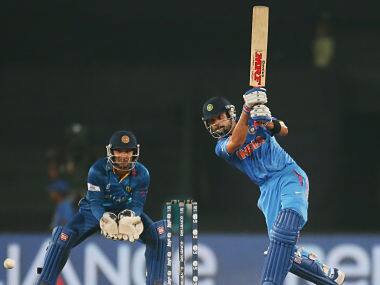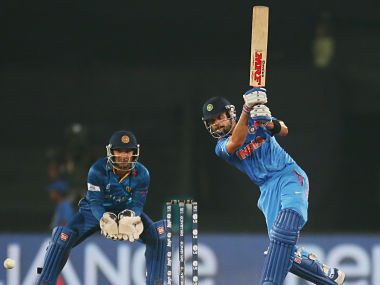For his next trick, Virat Kohli will walk across the Yamuna and leap over the Taj Mahal. After what he has accomplished in recent years, it should be a piece of cake. Kohli scooped up up the Man of the Tournament award by breaking the record for most runs scored in the event with 319 and averaging a measly 106.33 while batting at no 3, He now averages 45.30 in T20 internationals. That happens to be higher than anyone who has scored more than 500 runs in the format. Over the last two years, Kohli’s T20I average is 54.71. Only JP Duminy, who averages 49.81 over the same span, is within 15 runs of him. [caption id=“attachment_1470413” align=“alignleft” width=“380”]  Virat Kohli was seemingly born to makes runs. Getty Images[/caption] What Kohli has accomplished with a cricket bat in limited overs cricket over the last few years has always been theoretically possible, but much like the recently discovered Higgs-Boson particle, had been confined to the realm of mathematical possibility. Thankfully for cricket fans everywhere, you don’t need a Large Hadron Collider to see Kohli bat. A simple cable connection works perfectly well. Hard to believe, but the numbers get better as the pressure rises. When India chase, he averages 104.25. In T20 cricket. Yes, it is only 8 games but it is keeping with what he does in ODI cricket. He has averaged 78,66 in chases the last 24 months and 80.42 over the last 12. Far from shrinking, Kohli shines in the spotlight. In the final against Sri Lanka, Kohli appeared to be playing a game with which the rest of India’s team was not familiar. The cleanliness with which he struck the ball stood in perfect contrast to Yuvraj Singh’s inability to manufacture even a simple single. The frustration of not being on strike was etched on Kohli’s expressive face. He doesn’t just live for the big occasion, he lives to dominate it. What is amazing is how often he does actually dominate. The law of averages suggests it cannot last. Kohli cannot keep going out and scoring runs as and when and how he pleases. He cannot keep nicking singles and twos in between smacking the ball through and over midwicket. Sooner or later, this run, this wonderful, crazy, improbable run of his where neither bowler nor target nor pitch matter, must come to a halt. But the law of averages can also be a funny thing. Roughly 80 years ago, a 26-year-old Australian batsman re-writing the record books was asked to dinner by great cricket writer, Neville Cardus after the first day’s play at Headingley. But Sir Donald Bradman turned down the invite, saying he needed an early night as Australia required him to score a double century the next day Cardus reminded the Don that he had made 334 the last time he played at Leeds and the law of averages was against him making another big score. “I don’t believe in the law of averages,” was the succinct riposte. Then, over the next day and a half, Bradman rammed home his point by making 304 and sharing a then world record partnership of 388 with Bill Ponsford. Kohli wasn’t quite as pithy after his after his match-winning 72 against South Africa in the semi-final, saying, “Cricket is played more between your ears than your technique. If you can mentally be strong then you can tell yourself to stay on the wicket.” But the sentiment he expressed is the same. The law of averages does not apply, is not even to be contemplated. It is only Kohli’s state of mind that matters. Everything else is mere detail. The vicissitudes of sport mean failure typically lurks around the next corner. But we have become habituated to Kohli’s excellence. We expect him to succeed, much as we used to expect Roger Federer would win Wimbledon and still expect Rafael Nadal to win the French Open. We expect Kohli to astonish us. We expect him to shine again and again and again. Kohli has made believers of us all, just as Bradman did of cricket fans eight decades ago. We should enjoy it for as long as it lasts and be grateful we were there to bear witness.
We have become habituated to Kohli’s excellence. We expect him to succeed, much as we used to expect Roger Federer would win Wimbledon and still expect Rafael Nadal to win the French Open.
Advertisement
End of Article
Written by Tariq Engineer
Tariq Engineer is a sports tragic who willingly forgoes sleep for the pleasure of watching live events around the globe on television. His dream is to attend all four tennis Grand Slams and all four golf Grand Slams in the same year, though he is prepared to settle for Wimbledon and the Masters. see more


)

)
)
)
)
)
)
)
)



